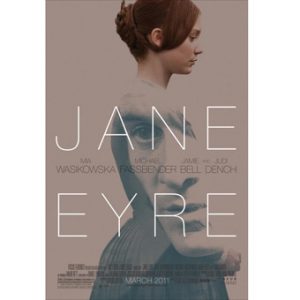Jane Eyre
Directed by Cary Fukunaga (Focus Features, 2011)
 There are secrets hidden in the shadows of Thornfield Hall, but no mystery as to why Hollywood has made nearly 20 films based on Charlotte Brontë’s Gothic tale of forbidden love.
There are secrets hidden in the shadows of Thornfield Hall, but no mystery as to why Hollywood has made nearly 20 films based on Charlotte Brontë’s Gothic tale of forbidden love.
More than 160 years after Brontë created her, Jane Eyre remains a riveting and original character. An orphaned waif betrayed by a bloodless aunt who dispatches her to a Victorian gulag of a boarding school, the disinherited Jane is forced to make her way in the world as an impoverished governess and teacher of other people’s children.
But rather than being soured and embittered by abandonment and abuse, Jane’s passion for love and freedom is fueled by the long winter of their absence, and the young governess enters her service at the remote and windswept Thornfield Hall lit by an inner warmth and intellect betraying her plain and humble countenance.
At Thornfield, however, Jane (Mia Wasikowska) must deal with Edward Rochester (Michael Fassbender), the often absent and emotionally erratic master of the manor. And she must sort out her own growing passions for this dark and wild man who awakens friendship and love in her but seems unreachable in mysterious ways. Rochester is a man of contradictions and secrets, and Jane’s passions and virtues respond to him in conflicting ways, forcing her to make exhilarating and then excruciating choices.
And as Jane and Rochester act out the tumultuous drama of their stormy romance, Brontë (and director Cary Fukunaga) has set the two protagonists against a Gothic backdrop that manifests the swirling storms of their interior lives. Thornfield Hall is a dark, brooding, and lonely place ready to burst into flames. It is as if the passions, fears, and secrets lurking in Jane and Rochester have taken shape in its very stones. The only question is whether the love and warmth in Jane can construct a nurturing home for the two of them there—a question that has held our attention for more than 160 years.














Add comment